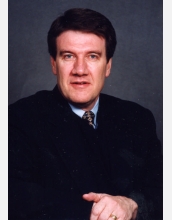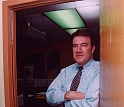News Release 06-114
Richard O. Buckius to Head NSF Engineering Directorate
University of Illinois at Urbana-Champaign (UIUC) mechanical engineer to begin term on Sept. 15, 2006

Richard O. Buckius, assistant director of the NSF Directorate for Engineering.
August 10, 2006
This material is available primarily for archival purposes. Telephone numbers or other contact information may be out of date; please see current contact information at media contacts.
The National Science Foundation (NSF) has named Richard O. Buckius, professor of mechanical engineering and former head of the Department of Mechanical and Industrial Engineering at the University of Illinois at Urbana-Champaign (UIUC), as the new NSF assistant director for engineering. Buckius has been serving as acting assistant director since Sept. 1, 2005, and assumes his new role for a 2-year term beginning Sept. 15, 2006.
An expert in thermal sciences, Buckius joined the UIUC faculty in 1975, and was promoted to professor in 1984. He also served as the associate head of the Department of Mechanical and Industrial Engineering from 1985 to 1987 and as associate vice chancellor for research from 1988 to 1991. He received B.S., M.S. and Ph.D. degrees in mechanical engineering from the University of California, Berkeley.
Prior to serving as acting assistant director for engineering at NSF, Buckius led NSF's Thermal Systems and Engineering Program and the Division of Chemical and Transport Systems from 2004 to 2005.
"As acting assistant director for engineering, Richard Buckius demonstrated exceptional leadership and dedication to the foundation," said NSF Director Arden L. Bement, Jr. "We look forward to his continued vision and support of education, research, discovery and innovation."
Buckius has gained an international reputation for leadership in the field of thermal sciences, authoring over 80 journal articles and a textbook on thermodynamics. He has played an active role disseminating engineering knowledge as both an educator and in editorial roles for the ASME Journal of Heat Transfer,the AIAA Journal of Thermophysics and Heat Transfer, Microscale Thermophysical Engineering, Heat Transfer Research and Heat Transfer-Japanese Research.
Buckius brings to his position an appreciation for the importance of engineering education. He has taught at all undergraduate and graduate levels, and has repeatedly been honored at the local and national level for teaching excellence. In 1980, he was recognized with the highest honor bestowed on educators on the UIUC campus, the UIUC Campus Award for Excellence in Undergraduate Teaching (now called the Luckman award).
He has received the W.L. Everitt Undergraduate Teaching Excellence Award, the UIUC College of Engineering Halliburton Engineering Education Leadership Award, the Stanley H. Pierce Faculty Award for promoting empathy between students and faculty, and on six occasions, the alumni's Effective Teaching Award.
Nationally, Buckius' teaching earned him the American Society for Engineering Education Dow Outstanding Young Faculty Award, ASEE Western Electric Fund Award and the 2003 ASEE Ralph Coats Roe Award for "sustained teaching excellence at both the undergraduate and graduate levels, significant research contributions to radiation heat transfer and combustion, exemplary professional service and outstanding administrative leadership."
Recently, Buckius received the 2006 James Harry Potter Gold Medal from the American Society of Mechanical Engineers, which recognizes eminent achievement "in the science of thermodynamics in mechanical engineering."
-NSF-
-
Richard O. Buckius, assistant director of the NSF Directorate for Engineering.
Credit and Larger Version
Media Contacts
Joshua A. Chamot, NSF, (703) 292-7730, email: jchamot@nsf.gov
The U.S. National Science Foundation propels the nation forward by advancing fundamental research in all fields of science and engineering. NSF supports research and people by providing facilities, instruments and funding to support their ingenuity and sustain the U.S. as a global leader in research and innovation. With a fiscal year 2023 budget of $9.5 billion, NSF funds reach all 50 states through grants to nearly 2,000 colleges, universities and institutions. Each year, NSF receives more than 40,000 competitive proposals and makes about 11,000 new awards. Those awards include support for cooperative research with industry, Arctic and Antarctic research and operations, and U.S. participation in international scientific efforts.
Connect with us online
NSF website: nsf.gov
NSF News: nsf.gov/news
For News Media: nsf.gov/news/newsroom
Statistics: nsf.gov/statistics/
Awards database: nsf.gov/awardsearch/
Follow us on social
Twitter: twitter.com/NSF
Facebook: facebook.com/US.NSF
Instagram: instagram.com/nsfgov



